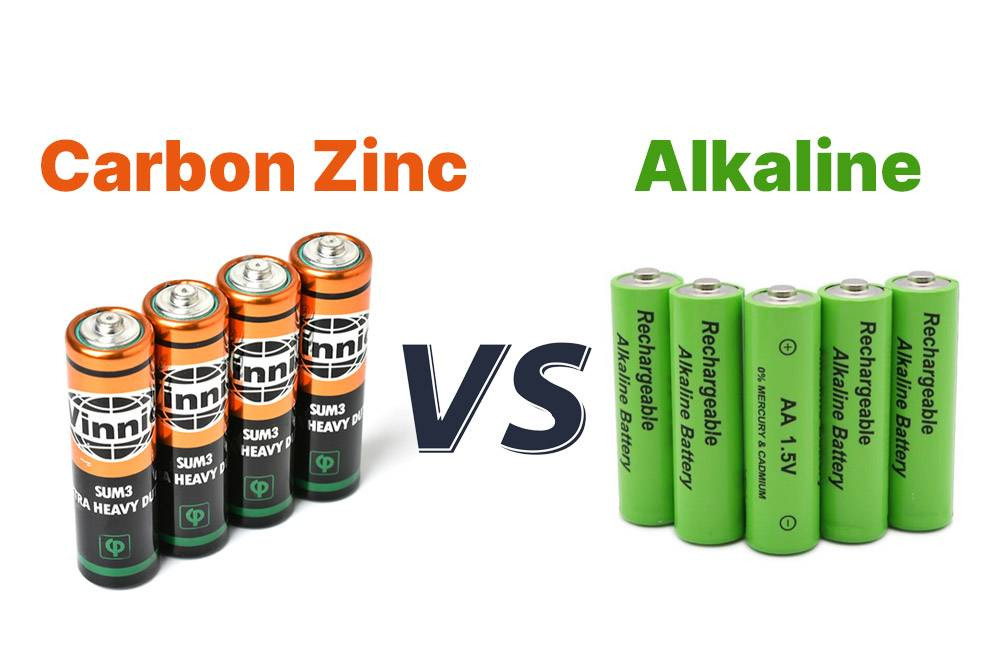In the world of portable power, two common household names stand out: carbon zinc batteries and alkaline batteries. While both serve the purpose of providing energy to our devices, they possess distinct characteristics that make them suitable for different applications. Let's explore the nuances of each to help you make an informed decision.

Composition and Chemistry
What is Carbon Zinc Batteries vs Alkaline Batteries?
Carbon Zinc Batteries
Carbon zinc batteries, also known as zinc-carbon batteries, have been around for over a century and are one of the earliest types of dry cell batteries. They consist of a zinc anode, a manganese dioxide cathode, and an electrolyte paste typically composed of ammonium chloride or zinc chloride dissolved in water. The chemical reaction between zinc and manganese dioxide generates electrical energy.
Alkaline Batteries
Alkaline batteries, on the other hand, feature a zinc anode, a manganese dioxide cathode, and an alkaline electrolyte, commonly potassium hydroxide. This alkaline electrolyte allows for a more efficient chemical reaction, resulting in higher energy output compared to carbon zinc batteries.
Performance and Capacity
Power Output
Alkaline batteries offer higher power output and longer-lasting performance than carbon zinc batteries. This is due to the presence of the alkaline electrolyte, which facilitates a more efficient chemical reaction and provides a stable voltage output over the battery's lifespan.
Shelf Life
Alkaline batteries also boast a significantly longer shelf life compared to carbon zinc batteries. While carbon zinc batteries may start to lose their charge after a few years of storage, alkaline batteries can retain their power for up to ten years or more, making them ideal for emergency use and devices with infrequent usage.
Usage in High-Drain Devices
For high-drain devices such as digital cameras, electronic toys, and portable gaming devices, alkaline batteries are the preferred choice due to their ability to deliver a consistent and reliable power supply. Carbon zinc batteries, while suitable for low-drain devices like remote controls and wall clocks, may struggle to meet the power demands of high-drain gadgets.
Cost and Availability
Price Comparison
In terms of cost, carbon zinc batteries are generally more affordable than alkaline batteries. This makes them a popular choice for budget-conscious consumers and for devices that require frequent battery replacement, such as TV remotes and flashlights.
Market Presence
Alkaline batteries, however, dominate the market in terms of availability and variety. They are widely stocked in stores and come in various sizes and brands to suit different consumer needs. While carbon zinc batteries are still in production and readily available, their market share has dwindled in recent years in favor of alkaline and rechargeable battery options.
Environmental Impact
Recycling
Both carbon zinc and alkaline batteries can be recycled to recover valuable materials such as zinc, manganese, and steel. Many recycling centers accept household batteries for proper disposal, helping to reduce environmental pollution and conserve natural resources.
Disposal
However, if not recycled properly, batteries can pose a threat to the environment due to the presence of heavy metals and corrosive electrolytes. It's important to dispose of batteries responsibly and follow local regulations regarding hazardous waste disposal to minimize their environmental impact.
Conclusion
In conclusion, the choice between carbon zinc batteries and alkaline batteries ultimately depends on your specific needs and priorities. While carbon zinc batteries offer affordability and are suitable for low-drain devices, alkaline batteries provide superior performance, longer shelf life, and wider availability, making them the preferred choice for most applications. Whichever option you choose, remember to recycle your batteries responsibly to minimize environmental harm.
FAQs
Are alkaline batteries safer than carbon zinc batteries?
Alkaline batteries are generally considered safer than carbon zinc batteries due to their less corrosive electrolyte and longer shelf life.
Can I use alkaline batteries in devices designed for carbon zinc batteries?
Yes, alkaline batteries are compatible with devices that require carbon zinc batteries. However, they may offer better performance and longevity.
Are carbon zinc batteries rechargeable?
No, carbon zinc batteries are not rechargeable. Attempting to recharge them can result in leakage or damage to the battery.
Which type of battery is better for remote controls?
Both carbon zinc and alkaline batteries can be used in remote controls, but alkaline batteries are often preferred for their longer-lasting power.
Do alkaline batteries leak more than carbon zinc batteries?
Alkaline batteries are less prone to leakage compared to carbon zinc batteries, especially when used in high-drain devices.
